For the 2025 school year, there is 1 public high school serving 1,278 students in Jay School Corporation School District. This district's average high testing ranking is 7/10, which is in the top 50% of public high schools in Indiana.
Public High School in Jay School Corporation School District have an average math proficiency score of 37% (versus the Indiana public high school average of 29%), and reading proficiency score of 44% (versus the 46% statewide average).
Public High School in Jay School Corporation School District have a Graduation Rate of 83%, which is less than the Indiana average of 88%.
The school with highest graduation rate is Jay County Jr/sr High School, with 83% graduation rate. Read more about public school graduation rate statistics in Indiana or national school graduation rate statistics.
Minority enrollment is 11% of the student body (majority Hispanic), which is less than the Indiana public high school average of 36% (majority Hispanic and Black).
Overview
This School District
This State (IN)
# Schools
6 Schools
486 Schools
# Students
2,987 Students
357,980 Students
# Teachers
216 Teachers
23,187 Teachers
Student : Teacher Ratio
14:1
14:1
District Rank
Jay School Corporation School District, which is ranked within the top 50% of all 394 school districts in Indiana (based off of combined math and reading proficiency testing data) for the 2021-2022 school year.
The school district's graduation rate of 83% has decreased from 96% over five school years.
Overall District Rank
#132 out of 400 school districts
(Top 50%)
(Top 50%)
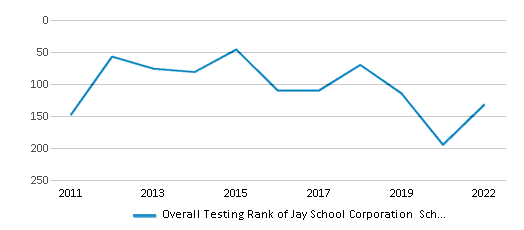
Math Test Scores (% Proficient)
44%
38%
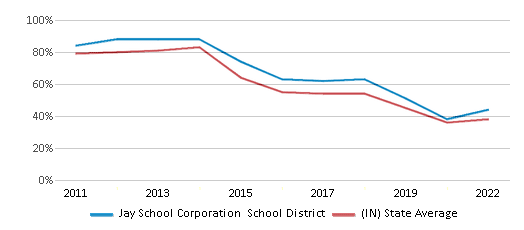
Reading/Language Arts Test Scores (% Proficient)
42%
41%
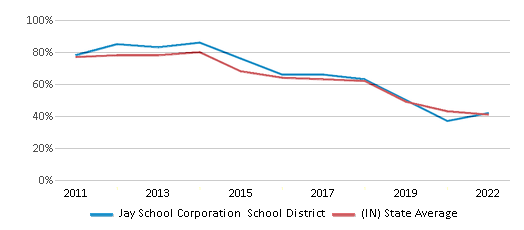
Science Test Scores (% Proficient)
32%
34%
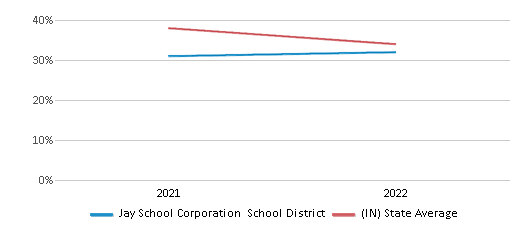
Graduation Rate
83%
88%
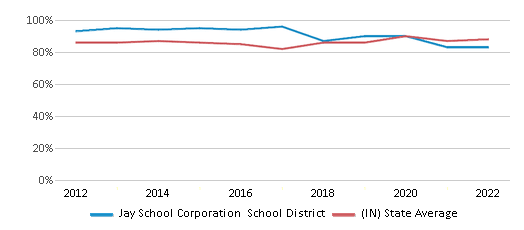
Students by Ethnicity:
Diversity Score
0.20
0.55
# American Indian Students
3 Students
616 Students
% American Indian Students
n/a
n/a
# Asian Students
14 Students
9,609 Students
% Asian Students
n/a
3%
# Hispanic Students
235 Students
52,018 Students
% Hispanic Students
8%
14%
# Black Students
16 Students
48,550 Students
% Black Students
1%
14%
# White Students
2,663 Students
229,391 Students
% White Students
89%
64%
# Hawaiian Students
1 Student
355 Students
% Hawaiian Students
n/a
n/a
# Two or more races Students
55 Students
17,441 Students
% of Two or more races Students
2%
5%
Students by Grade:
# Students in PK Grade:
55
470
# Students in K Grade:
257
977
# Students in 1st Grade:
220
1,069
# Students in 2nd Grade:
255
1,085
# Students in 3rd Grade:
251
1,128
# Students in 4th Grade:
220
1,106
# Students in 5th Grade:
233
1,181
# Students in 6th Grade:
215
3,024
# Students in 7th Grade:
259
10,217
# Students in 8th Grade:
214
10,906
# Students in 9th Grade:
203
80,749
# Students in 10th Grade:
208
82,602
# Students in 11th Grade:
192
81,106
# Students in 12th Grade:
197
79,954
# Ungraded Students:
8
2,406
District Revenue and Spending
The revenue/student of $14,009 is higher than the state median of $13,222. The school district revenue/student has stayed relatively flat over four school years.
The school district's spending/student of $12,667 is less than the state median of $12,852. The school district spending/student has stayed relatively flat over four school years.
Total Revenue
$42 MM
$13,615 MM
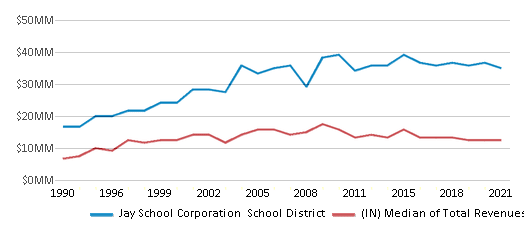
Spending
$38 MM
$13,234 MM
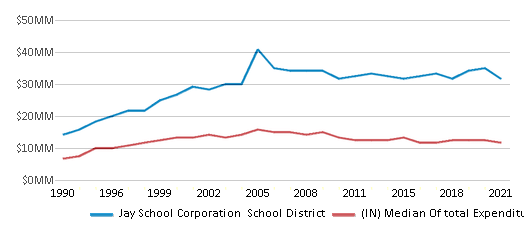
Revenue / Student
$14,009
$13,222
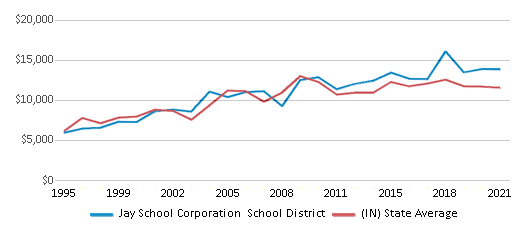
Spending / Student
$12,667
$12,852
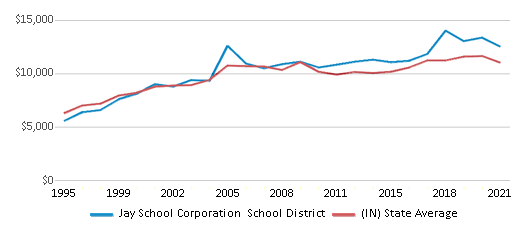
Best Jay School Corporation School District Public High Schools (2025)
School
(Math and Reading Proficiency)
(Math and Reading Proficiency)
Location
Grades
Students
Rank: #11.
Jay County Jr/sr High School
(Math: 37% | Reading: 44%)
Rank:
Rank:
6/
Top 50%10
2072 W Sr 67
Portland, IN 47371
(260) 726-9306
Portland, IN 47371
(260) 726-9306
Grades: 7-12
| 1,278 students
Recent Articles

Year-Round Or Traditional Schedule?
Which is more appropriate for your child? A year-round attendance schedule or traditional schedule? We look at the pros and cons.

Why You Should Encourage Your Child to Join a Sports Team
Participating in team sports has a great many benefits for children, there is no doubt. In this article you will learn what those benefits are.

White Students are Now the Minority in U.S. Public Schools
Increasing birth rates among immigrant families from Asia and Central and South America, combined with lower birth rates among white families, means that for the first time in history, public school students in the United States are majority-minority. This shift in demographics poses difficulties for schools as they work to accommodate children of varying language abilities and socio-economic backgrounds.





